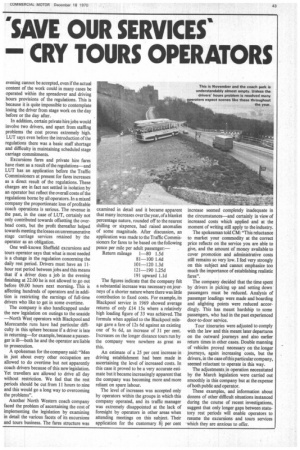'SAVE OUR SERVICES' CRY TOURS OPERATORS
Page 45

If you've noticed an error in this article please click here to report it so we can fix it.
evening cannot be accepted, even if the actual content of the work could in many cases be operated within the spreadover and driving hours provisions of the regulations. This is because it is quite impossible to contemplate losing the driver from stage work on the day before or the day after.
In addition, certain private hire jobs would involve two drivers, and apart from staffing problems the cost proves extremely high. LUT says even before the introduction of the regulations there was a basic staff shortage and difficulty in maintaining scheduled stage carriage commitments.
Excursions fares and private hire fares have risen as a result of the regulations—and LUT has an application before the Traffic Commissioners at present for fares increases as a direct result of the regulations. These charges are in fact not settled in isolation by an operator but reflect the overall costs of the regulations borne by all operators. In a mixed company the proportionate loss of profitable coach operations is serious. The revenue in the past, in the case of LUT, certainly not only contributed towards offsetting the overhead costs, but the profit thereafter helped towards meeting the losses on unremunerative stage carriage services retained by the operator as an obligation.
One well-known Sheffield excursions and tours operator says that what is most needed is a change in the regulation concerning the daily rest period. Drivers must have an 11hour rest period between jobs and this means that if a driver does a job in the evening finishing at 22.00 he is not allowed to go out before 09.00 hours next morning. This is affecting hundreds of operators and in addition is restricting the earnings of full-time drivers who like to get in some overtime.
The company is also handicapped under the new legislation on outings to the seaside —North West operators with Blackpool and Morecambe runs have had particular difficulty in this sphere because if a driver is late in returning—for example, because a passenger is ill—both he and the operator are liable to prosecution.
A spokesman for the company said: "Men in just about every other occupation are allowed to do overtime but not apparently coach drivers because of this new legislation. Yet travellers are allowed to drive all day without restriction. We feel that the rest periods should be cut from 11 hours to nine and this would go a long way to overcoming the problems".
Another North Western coach company faced the problem of ascertaining the cost of implementing the legislation by examining in detail the various facets of its excursions and tours business. The fares structure was
examined in detail and it became apparent that many increases over the year, of a blanket percentage nature, rounded off to the nearest shilling or sixpence, had raised anomalies of some magnitude. After discussion, an application was made to the Traffic Commissioners for fares to be based on the following pence per mile per adult passenger:—
Return mileage 1-80 1.5d 81-100 1.4d 101-120 1.3d 121-190 1.25d 191 upward 1.1d The figures indicate that the company felt a substantial increase was necessary on journeys of a shorter nature where there was little contribution to fixed costs. For example, its Blackpool service in 1969 showed average returns of only £14 15s where a relatively high loading figure of 33 was achieved. The formula when applied to the Blackpool mileage gave a fare of 12s 6d against an existing one of 9s 6d, an increase of 31 per cent. Increases on the longer distance tours run by the company were nowhere as great as this.
An estimate of a 25 per cent increase in driving establishment had been made in ascertaining the level of increased costs. In this case it proved to be a very accurate estimate but it became increasingly apparent that the company was becoming more and more reliant on spare labour.
The level of increases was accepted only by operators within the groups in which this company operated, and its traffic manager was extremely disappointed at the lack of foresight by operators in other areas when attending meetings on this subject. Their application for the customary 8+ per cent increase seemed completely inadequate in the circumstances—and certainly in view of increased costs which applied and at the moment of writing still apply to the industry.
The spokesman told CM: "This reluctance to market your commodity at the correct price reflects on the service you are able to give, and the amount of money available to cover promotion and administrative costs still remains so very low. I feel very strongly on this subject and cannot emphasize too much the importance of establishing realistic fares".
The company decided that the time spent by drivers in picking up and setting down passengers must be reduced. Analysis of passenger loadings were made and boarding and alighting points were reduced accordingly. This has meant hardship to some passengers, who had in the past experienced door-to-door service.
Tour itineraries were adjusted to comply with the law and this meant later departures on the outward journeys and also earlier return times in other cases. Double manning of vehicles proved necessary on the longer journeys, again increasing costs, but the drivers, in the case of this particular company, seemed reluctant to operate in this way.
The adjustments in operation necessitated by the March legislation were carried out smoothly in this company but at the expense of both public and operator.
These examples, and information about dozens of other difficult situations instanced during the course of recent investigations, suggest that only longer gaps between statutory rest periods will enable operators to resume the excursions and tours services -which they are anxious to offer.






















































































































